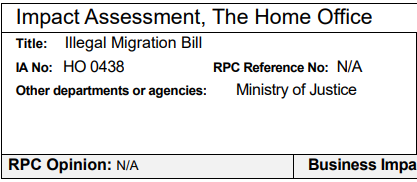The dangerous assumptions behind Home Office’s plan to ‘stop the boats’– by Sheona York, Kent Law Clinic
As reported in the BBC today,[1] the government has finally produced its Impact Assessment (IA) on the policy to prevent illegal migrants from making asylum claims in the UK. The headline from the Assessment is that it is likely to cost £169,000 per person to detain, process and remove each illegal migrant to a designated third country such as Rwanda. (That figure does not include the money already paid to Rwanda to set up the scheme). The scheme is then estimated to break even if numbers of illegal arrivals fall by 37%. In contrast, the cost of continuing with current policies, of allowing migrants to land on British soil and supporting them while processing their asylum claims, is calculated at £106,000 per person.
First, these assumptions are a sad and even shocking reflection on UK public administration. Government statistics show that at the end of March 2023, over 170,000 people awaited a decision, of whom 75% had waited more than 6 months, and many had waited more than a year. Despite referring to Home Office efforts to improve the rate of decision-making, the Impact Assessment’s assumption, against which it measures the benefits of the Illegal Migration Bill proposals, is that asylum cases would take 4 years. And if asylum processing speeded up to taking only 3 years, illegal arrivals would have to be cut by 50% to make offshoring them value for money.
We must be able to do better than this! Clearly, reducing asylum processing times to an administratively reasonable 3 months plus a further 3 months for an appeal (the aims of the New Asylum Model introduced in the 2000’s), or a tolerable 6 months’ decision time plus 6 months for an appeal, would make the adoption of the Illegal Migration Bill’s proposals look financially absurd. The adoption of the IMB proposals requires investment in enforcement staff, private sector escort services, medical staff and others. It also notes the predicted ‘opportunity cost in relation to other workstreams being de-prioritised’. The Assessment does not particularise here, but this means two things. Commercially valuable ‘managed migration‘ decision-making is affected, making Britain less competitive for skilled migrants. And desperate people making applications on ‘safe and legal routes’ are now finding themselves stuck for months in dangerous environments such as Khartoum. Why not, instead, use the funds earmarked for those proposals to invest in training and retaining asylum decision-makers capable of making early, legally adequate ‘right first time’ decisions, thus significantly reducing the costs of detention and asylum support, but without taking resources from ‘other workstreams’.
Secondly, some of the ‘savings’ identified from the IMB proposals arise from not having to spend on benefits, healthcare and other integration measures for those who would otherwise have been granted asylum. In other words, it is deemed a good thing to save money by removing or ‘deterring’ genuine refugees without considering their claims.
Thirdly, the downgraded assessment of the economic contributions of future refugees (through work and paying taxes) clearly ignores the problems facing refugees arising precisely from the long delays in processing their applications – loss of skills and knowledge becoming outdated, mental and physical stress of long waits and isolation from everyday life.
Finally, the question of ‘deterrence’ is revealed to be a red herring. The Impact Assessment accepts that motivations of migrants are manifold and the impacts of given policies are hard to test or measure. It examines policies from a number of other countries including Australia, Spain, Sweden and others, and concludes that very strict border regimes do lead to a reduction of illegal crossings there, but cannot guarantee that other routes are not then developed. However the Impact Assessment then frankly states that the benefits of the scheme are achieved irrespective of whether an individual is deterred from entry or is removed after having arrived and therefore is unaffected by the deterrence level achieved. The ‘benefits of the scheme’ then clearly depend on removals. But, as many have already commented, implementing the IMB proposals without returns agreements will just result in thousands of asylum-seekers detained in the UK in poor conditions maybe for years.
Sheona York
Kent Law Clinic 27/6/23

